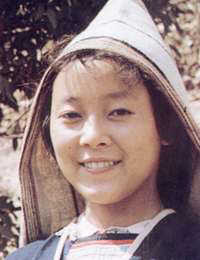 Numbering 18,021 (as of 1990) in all, the Jinos live in the Jinoluoke Township of Jinghong County in the Xishuangbanna Dai Autonomous Prefecture, Yunnan Province.
Numbering 18,021 (as of 1990) in all, the Jinos live in the Jinoluoke Township of Jinghong County in the Xishuangbanna Dai Autonomous Prefecture, Yunnan Province.
The language of this ethnic minority belongs to the Tibeto-Burman Austronesian of the Chinese-Tibetan Phylum. They have no written script and historically kept records by notching wood or bamboo. Nowadays, the language of the Han people is in common use among the Jinuo people.
It is said that the Jinos migrated to Jinoluoke from Pu'er and Mojiang or places even farther north. Long time ago, there was a story told about a lost army. During the Three Kingdom Period (222-280AD), the famous military counselor -- Zhu Geliang, also named Kongming, led his army to fight; one branch of the army enthralled in sleeping on the way, and was left behind. Though the branch caught up at last, it would not be accepted. In order to let them survive, Kongming donated seeds of tea towards them and urged them to plant. Although, the story could not tell the history, it surely told the ancient Jino was closely to the Han nationality.
The Jino matriarchal society gave way to a patriarchal one some 300 years ago. But the Jinos were still in the transitional stage from a primitive to a class society at the time the People's Republic was founded in 1949. In 1979, it was proved by the State as the Jino ethnic minority.
Agriculture is the mainstay of the ethnic minority. The areas populated by the Jino people are blessed with a mild climate, plentiful water resources and abundant rainfall, all of which provide excellent support for agricultural production. The Jonos are great hunters, and the primitive forest on the mountain also abounds in a variety of wild animals such as hornbills, wild elephants, monkeys, etc. The Jino people have a long history of tea-growing. The famous Pu'er tea grows in Jino Mountain.
The Jino people are animists, believing that all things on earth have souls. They worship their ancestors, who they believe can bring good future and prosperity to their offspring.
Primitive egalitarianism still manifests itself to the present in Jino customs. They hunt in groups and divide the game equally among the participants. The meat of wild beasts brought back by hunters is divided equally among all adults and children in a village.
